Attached files
| file | filename |
|---|---|
| 8-K - FORM 8-K - NEW YORK COMMUNITY BANCORP INC | d172936d8k.htm |
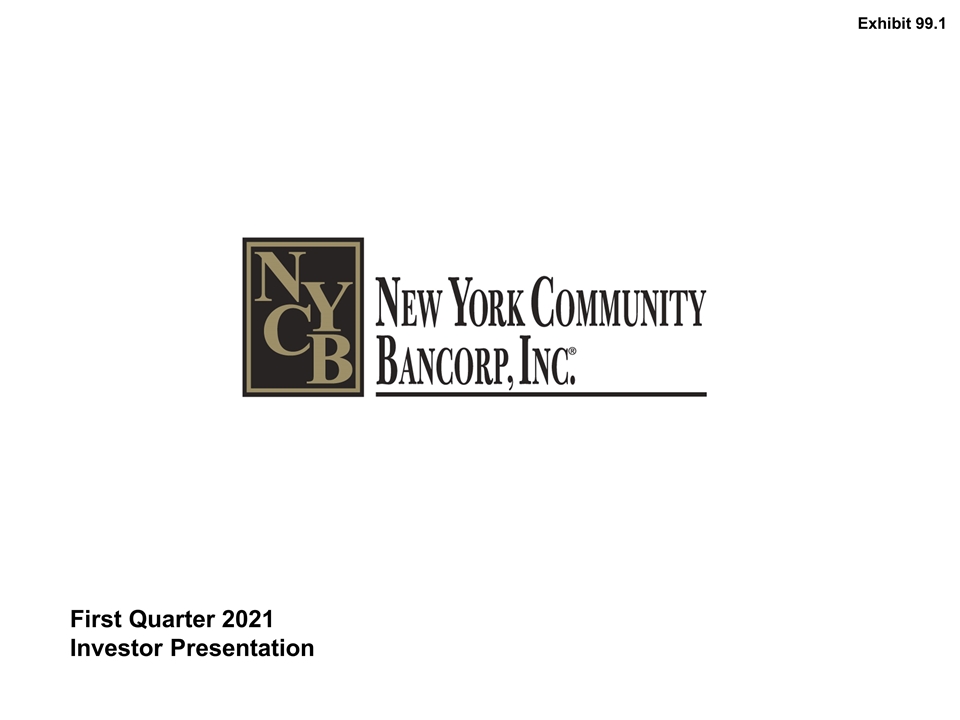
First Quarter 2021 Investor Presentation Exhibit 99.1
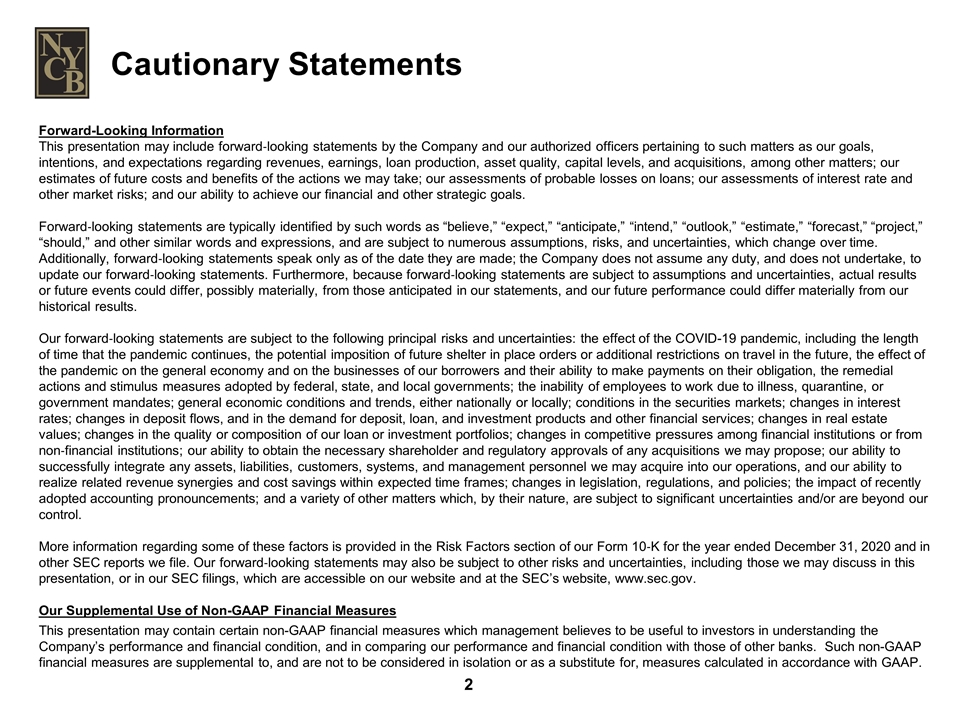
Forward-Looking Information This presentation may include forward‐looking statements by the Company and our authorized officers pertaining to such matters as our goals, intentions, and expectations regarding revenues, earnings, loan production, asset quality, capital levels, and acquisitions, among other matters; our estimates of future costs and benefits of the actions we may take; our assessments of probable losses on loans; our assessments of interest rate and other market risks; and our ability to achieve our financial and other strategic goals. Forward‐looking statements are typically identified by such words as “believe,” “expect,” “anticipate,” “intend,” “outlook,” “estimate,” “forecast,” “project,” “should,” and other similar words and expressions, and are subject to numerous assumptions, risks, and uncertainties, which change over time. Additionally, forward‐looking statements speak only as of the date they are made; the Company does not assume any duty, and does not undertake, to update our forward‐looking statements. Furthermore, because forward‐looking statements are subject to assumptions and uncertainties, actual results or future events could differ, possibly materially, from those anticipated in our statements, and our future performance could differ materially from our historical results. Our forward‐looking statements are subject to the following principal risks and uncertainties: the effect of the COVID-19 pandemic, including the length of time that the pandemic continues, the potential imposition of future shelter in place orders or additional restrictions on travel in the future, the effect of the pandemic on the general economy and on the businesses of our borrowers and their ability to make payments on their obligation, the remedial actions and stimulus measures adopted by federal, state, and local governments; the inability of employees to work due to illness, quarantine, or government mandates; general economic conditions and trends, either nationally or locally; conditions in the securities markets; changes in interest rates; changes in deposit flows, and in the demand for deposit, loan, and investment products and other financial services; changes in real estate values; changes in the quality or composition of our loan or investment portfolios; changes in competitive pressures among financial institutions or from non‐financial institutions; our ability to obtain the necessary shareholder and regulatory approvals of any acquisitions we may propose; our ability to successfully integrate any assets, liabilities, customers, systems, and management personnel we may acquire into our operations, and our ability to realize related revenue synergies and cost savings within expected time frames; changes in legislation, regulations, and policies; the impact of recently adopted accounting pronouncements; and a variety of other matters which, by their nature, are subject to significant uncertainties and/or are beyond our control. More information regarding some of these factors is provided in the Risk Factors section of our Form 10‐K for the year ended December 31, 2020 and in other SEC reports we file. Our forward‐looking statements may also be subject to other risks and uncertainties, including those we may discuss in this presentation, or in our SEC filings, which are accessible on our website and at the SEC’s website, www.sec.gov. Our Supplemental Use of Non-GAAP Financial Measures This presentation may contain certain non-GAAP financial measures which management believes to be useful to investors in understanding the Company’s performance and financial condition, and in comparing our performance and financial condition with those of other banks. Such non-GAAP financial measures are supplemental to, and are not to be considered in isolation or as a substitute for, measures calculated in accordance with GAAP. Cautionary Statements
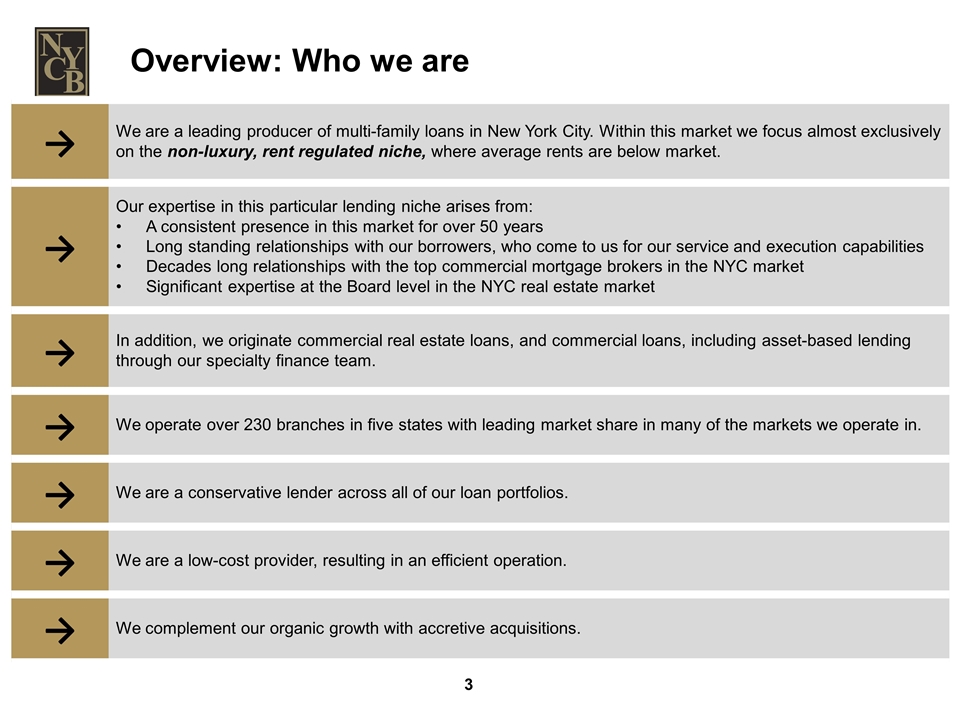
→ We are a leading producer of multi-family loans in New York City. Within this market we focus almost exclusively on the non-luxury, rent regulated niche, where average rents are below market. → Our expertise in this particular lending niche arises from: A consistent presence in this market for over 50 years Long standing relationships with our borrowers, who come to us for our service and execution capabilities Decades long relationships with the top commercial mortgage brokers in the NYC market Significant expertise at the Board level in the NYC real estate market → In addition, we originate commercial real estate loans, and commercial loans, including asset-based lending through our specialty finance team. → We operate over 230 branches in five states with leading market share in many of the markets we operate in. → We are a conservative lender across all of our loan portfolios. → We are a low-cost provider, resulting in an efficient operation. → We complement our organic growth with accretive acquisitions. Overview: Who we are
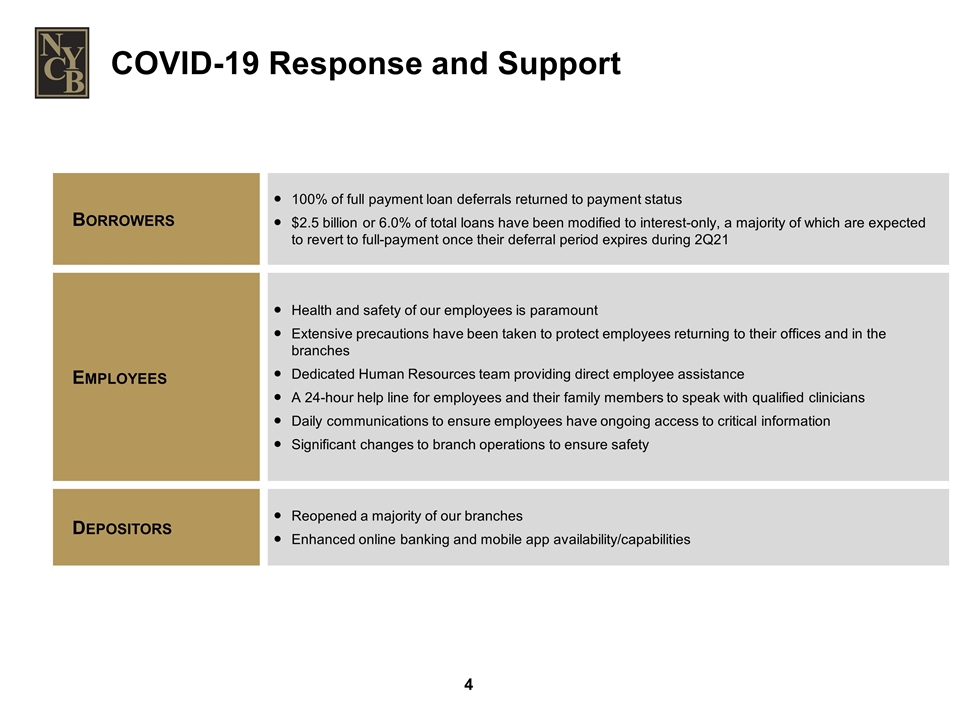
COVID-19 Response and Support Employees Health and safety of our employees is paramount Extensive precautions have been taken to protect employees returning to their offices and in the branches Dedicated Human Resources team providing direct employee assistance A 24-hour help line for employees and their family members to speak with qualified clinicians Daily communications to ensure employees have ongoing access to critical information Significant changes to branch operations to ensure safety Depositors Reopened a majority of our branches Enhanced online banking and mobile app availability/capabilities Borrowers 100% of full payment loan deferrals returned to payment status $2.5 billion or 6.0% of total loans have been modified to interest-only, a majority of which are expected to revert to full-payment once their deferral period expires during 2Q21
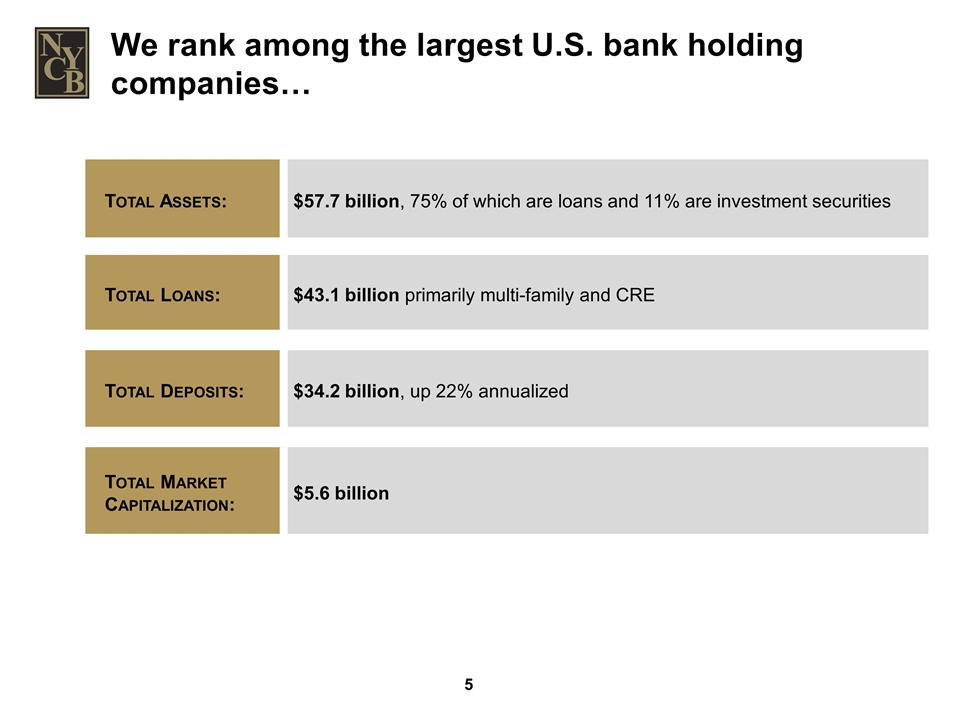
We rank among the largest U.S. bank holding companies… Total Assets: $57.7 billion, 75% of which are loans and 11% are investment securities Total Deposits: $34.2 billion, up 22% annualized Total Loans: $43.1 billion primarily multi-family and CRE Total Market Capitalization: $5.6 billion
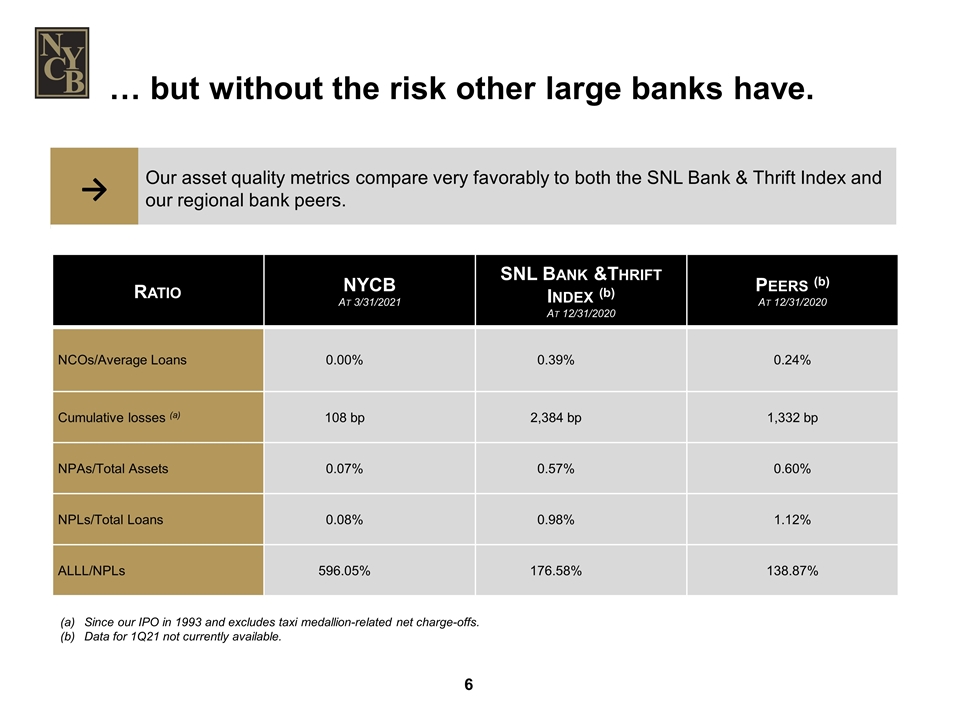
… but without the risk other large banks have. Ratio NYCB At 3/31/2021 SNL Bank &Thrift Index (b) At 12/31/2020 Peers (b) At 12/31/2020 NCOs/Average Loans 0.00% 0.39% 0.24% Cumulative losses (a) 108 bp 2,384 bp 1,332 bp NPAs/Total Assets 0.07% 0.57% 0.60% NPLs/Total Loans 0.08% 0.98% 1.12% ALLL/NPLs 596.05% 176.58% 138.87% → Our asset quality metrics compare very favorably to both the SNL Bank & Thrift Index and our regional bank peers. Since our IPO in 1993 and excludes taxi medallion-related net charge-offs. Data for 1Q21 not currently available.
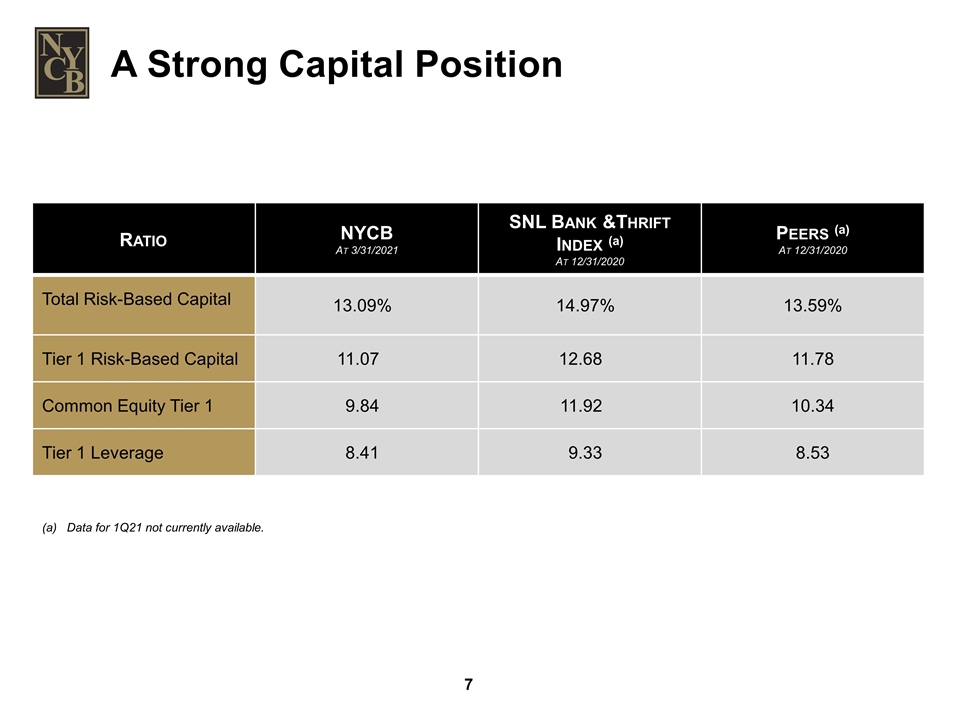
A Strong Capital Position Ratio NYCB At 3/31/2021 SNL Bank &Thrift Index (a) At 12/31/2020 Peers (a) At 12/31/2020 Total Risk-Based Capital 13.09% 14.97% 13.59% Tier 1 Risk-Based Capital 11.07 12.68 11.78 Common Equity Tier 1 9.84 11.92 10.34 Tier 1 Leverage 8.41 9.33 8.53 (a) Data for 1Q21 not currently available.
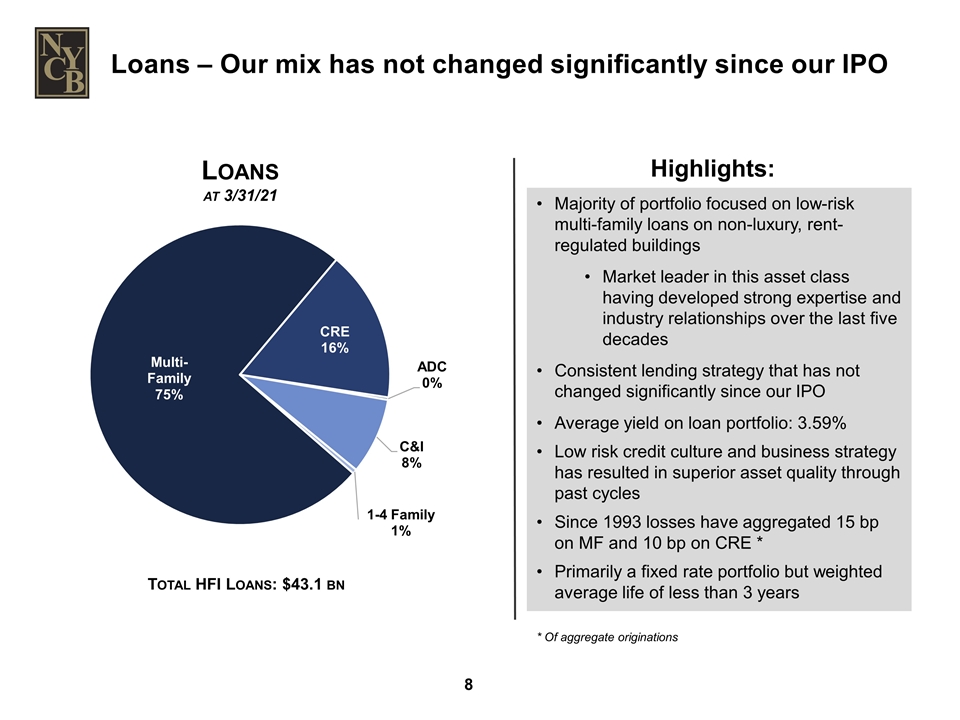
Total HFI Loans: $43.1 bn Loans at 3/31/21 Loans – Our mix has not changed significantly since our IPO Majority of portfolio focused on low-risk multi-family loans on non-luxury, rent-regulated buildings Market leader in this asset class having developed strong expertise and industry relationships over the last five decades Consistent lending strategy that has not changed significantly since our IPO Average yield on loan portfolio: 3.59% Low risk credit culture and business strategy has resulted in superior asset quality through past cycles Since 1993 losses have aggregated 15 bp on MF and 10 bp on CRE * Primarily a fixed rate portfolio but weighted average life of less than 3 years Highlights: * Of aggregate originations
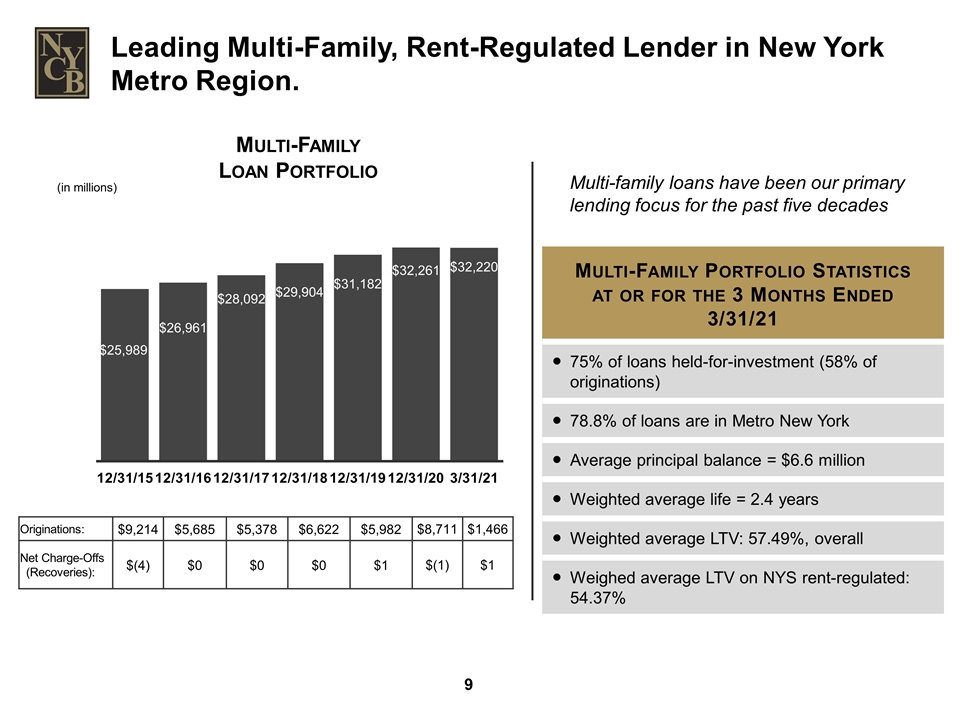
Multi-Family Portfolio Statistics at or for the 3 Months Ended 3/31/21 75% of loans held-for-investment (58% of originations) 78.8% of loans are in Metro New York Average principal balance = $6.6 million Weighted average life = 2.4 years Weighted average LTV: 57.49%, overall Weighed average LTV on NYS rent-regulated: 54.37% Multi-Family Loan Portfolio (in millions) Originations: $9,214 $5,685 $5,378 $6,622 $5,982 $8,711 $1,466 Net Charge-Offs (Recoveries): $(4) $0 $0 $0 $1 $(1) $1 Leading Multi-Family, Rent-Regulated Lender in New York Metro Region. Multi-family loans have been our primary lending focus for the past five decades
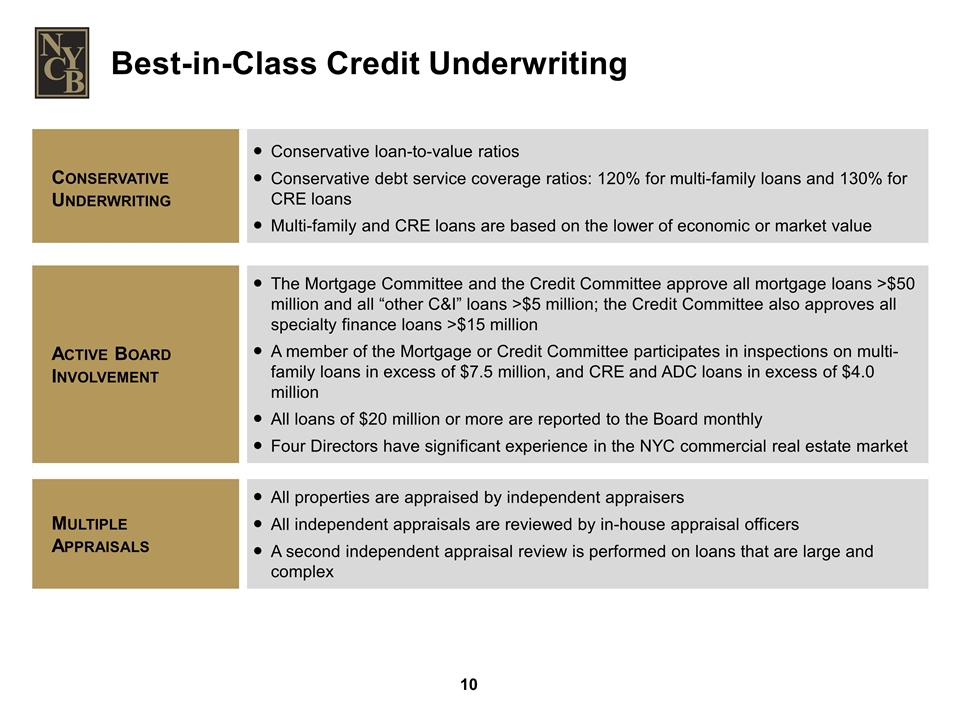
Best-in-Class Credit Underwriting Conservative Underwriting Conservative loan-to-value ratios Conservative debt service coverage ratios: 120% for multi-family loans and 130% for CRE loans Multi-family and CRE loans are based on the lower of economic or market value Active Board Involvement The Mortgage Committee and the Credit Committee approve all mortgage loans >$50 million and all “other C&I” loans >$5 million; the Credit Committee also approves all specialty finance loans >$15 million A member of the Mortgage or Credit Committee participates in inspections on multi-family loans in excess of $7.5 million, and CRE and ADC loans in excess of $4.0 million All loans of $20 million or more are reported to the Board monthly Four Directors have significant experience in the NYC commercial real estate market Multiple Appraisals All properties are appraised by independent appraisers All independent appraisals are reviewed by in-house appraisal officers A second independent appraisal review is performed on loans that are large and complex
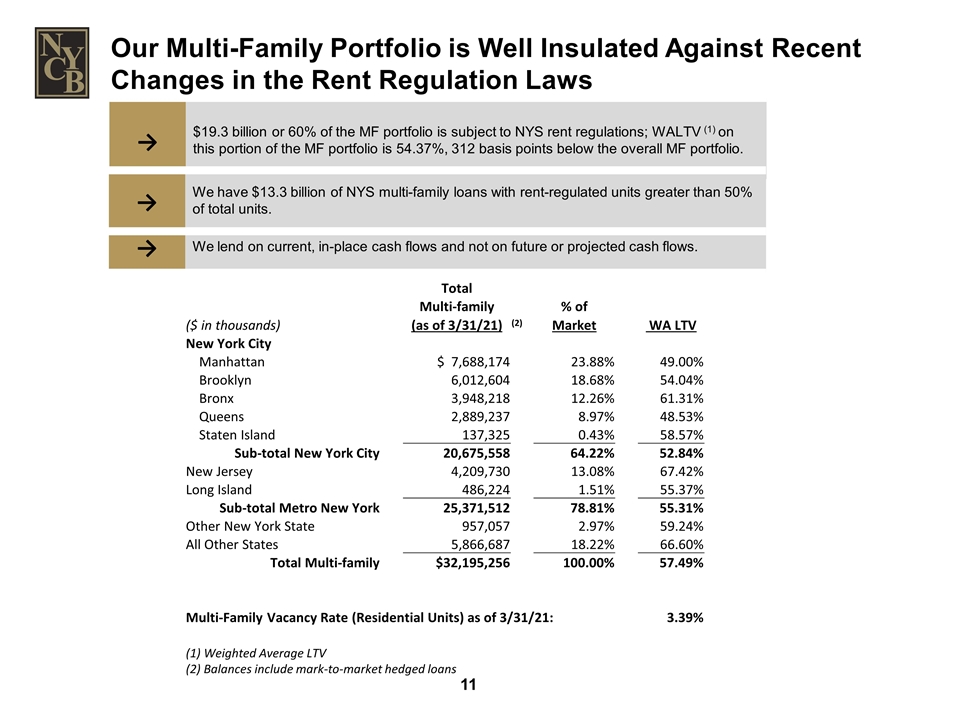
→ $19.3 billion or 60% of the MF portfolio is subject to NYS rent regulations; WALTV (1) on this portion of the MF portfolio is 54.37%, 312 basis points below the overall MF portfolio. Our Multi-Family Portfolio is Well Insulated Against Recent Changes in the Rent Regulation Laws → We lend on current, in-place cash flows and not on future or projected cash flows. → We have $13.3 billion of NYS multi-family loans with rent-regulated units greater than 50% of total units. Total Multi-family % of ($ in thousands) (as of 3/31/21) (2) Market WA LTV New York City Manhattan $ 7,688,174 23.88% 49.00% Brooklyn 6,012,604 18.68% 54.04% Bronx 3,948,218 12.26% 61.31% Queens 2,889,237 8.97% 48.53% Staten Island 137,325 0.43% 58.57% Sub-total New York City 20,675,558 64.22% 52.84% New Jersey 4,209,730 13.08% 67.42% Long Island 486,224 1.51% 55.37% Sub-total Metro New York 25,371,512 78.81% 55.31% Other New York State 957,057 2.97% 59.24% All Other States 5,866,687 18.22% 66.60% Total Multi-family $32,195,256 100.00% 57.49% Multi-Family Vacancy Rate (Residential Units) as of 3/31/21: 3.39% (1) Weighted Average LTV (2) Balances include mark-to-market hedged loans
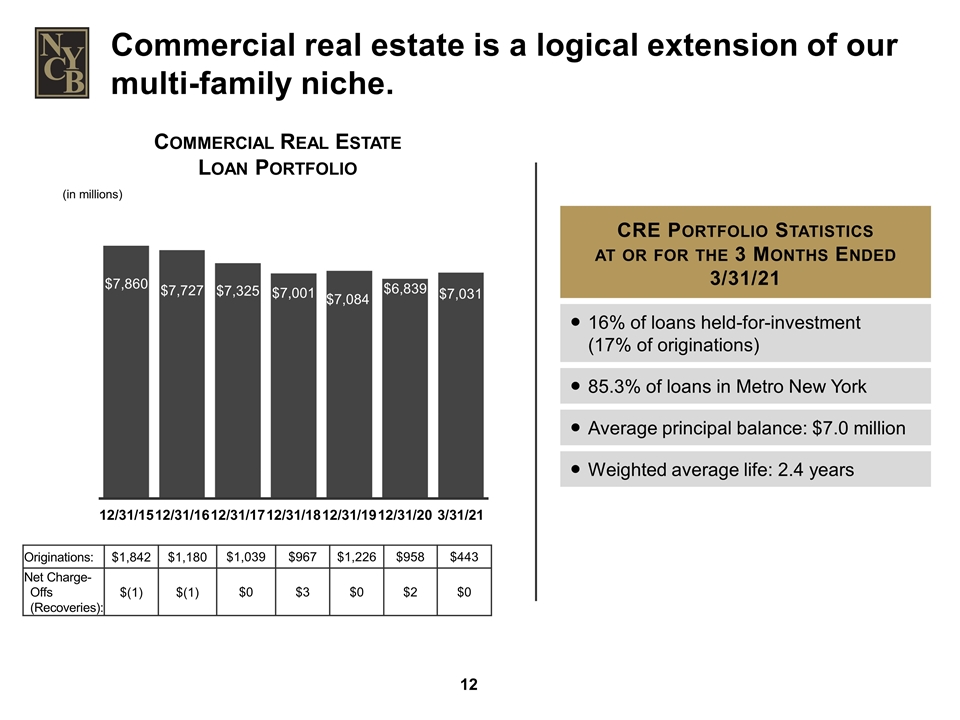
Commercial Real Estate Loan Portfolio (in millions) Originations: $1,842 $1,180 $1,039 $967 $1,226 $958 $443 Net Charge-Offs (Recoveries): $(1) $(1) $0 $3 $0 $2 $0 Commercial real estate is a logical extension of our multi-family niche. CRE Portfolio Statistics at or for the 3 Months Ended 3/31/21 16% of loans held-for-investment (17% of originations) 85.3% of loans in Metro New York Average principal balance: $7.0 million Weighted average life: 2.4 years
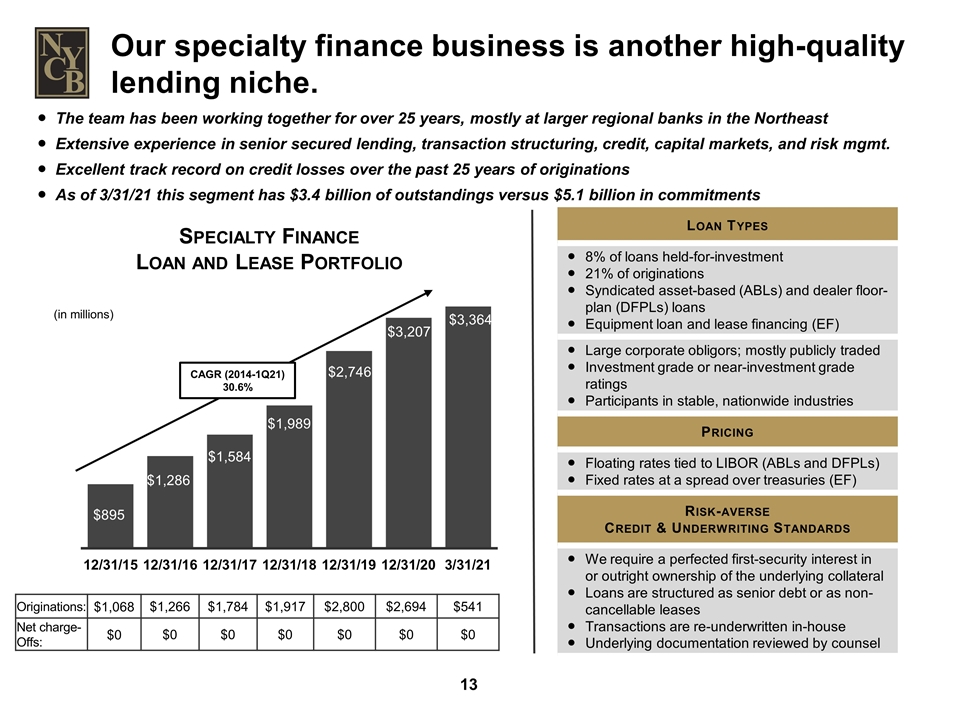
Specialty Finance Loan and Lease Portfolio (in millions) Originations: $1,068 $1,266 $1,784 $1,917 $2,800 $2,694 $541 Net charge-Offs: $0 $0 $0 $0 $0 $0 $0 Our specialty finance business is another high-quality lending niche. Loan Types 8% of loans held-for-investment 21% of originations Syndicated asset-based (ABLs) and dealer floor-plan (DFPLs) loans Equipment loan and lease financing (EF) Large corporate obligors; mostly publicly traded Investment grade or near-investment grade ratings Participants in stable, nationwide industries Pricing Floating rates tied to LIBOR (ABLs and DFPLs) Fixed rates at a spread over treasuries (EF) Risk-averse Credit & Underwriting Standards We require a perfected first-security interest in or outright ownership of the underlying collateral Loans are structured as senior debt or as non-cancellable leases Transactions are re-underwritten in-house Underlying documentation reviewed by counsel CAGR (2014-1Q21) 30.6% The team has been working together for over 25 years, mostly at larger regional banks in the Northeast Extensive experience in senior secured lending, transaction structuring, credit, capital markets, and risk mgmt. Excellent track record on credit losses over the past 25 years of originations As of 3/31/21 this segment has $3.4 billion of outstandings versus $5.1 billion in commitments
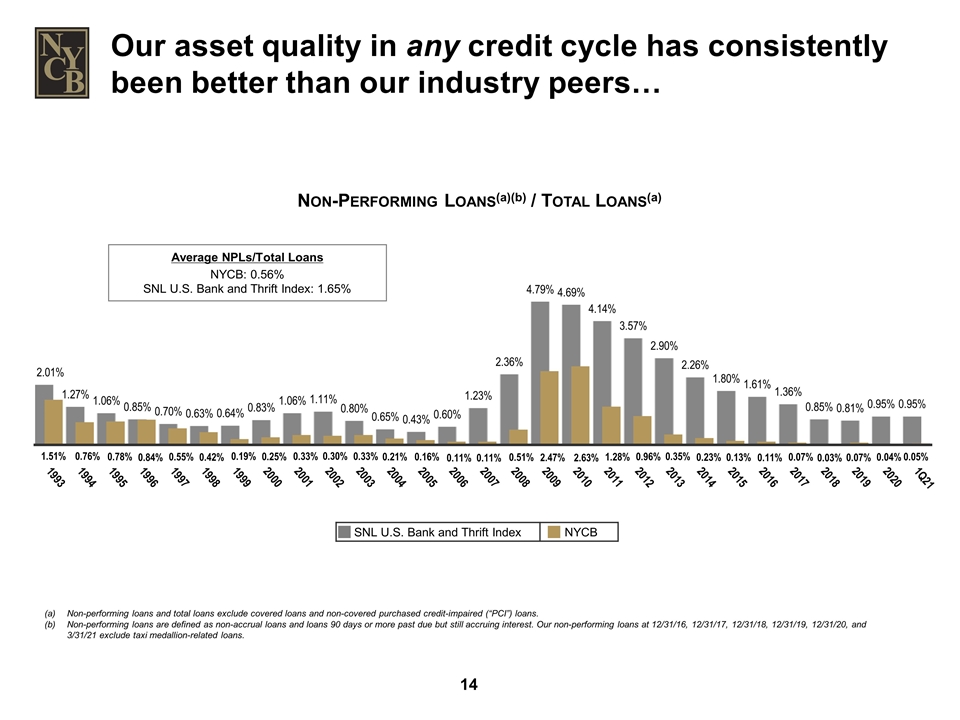
Non-Performing Loans(a)(b) / Total Loans(a) Non-performing loans and total loans exclude covered loans and non-covered purchased credit-impaired (“PCI”) loans. Non-performing loans are defined as non-accrual loans and loans 90 days or more past due but still accruing interest. Our non-performing loans at 12/31/16, 12/31/17, 12/31/18, 12/31/19, 12/31/20, and 3/31/21 exclude taxi medallion-related loans. Average NPLs/Total Loans NYCB: 0.56% SNL U.S. Bank and Thrift Index: 1.65% SNL U.S. Bank and Thrift Index NYCB Our asset quality in any credit cycle has consistently been better than our industry peers…
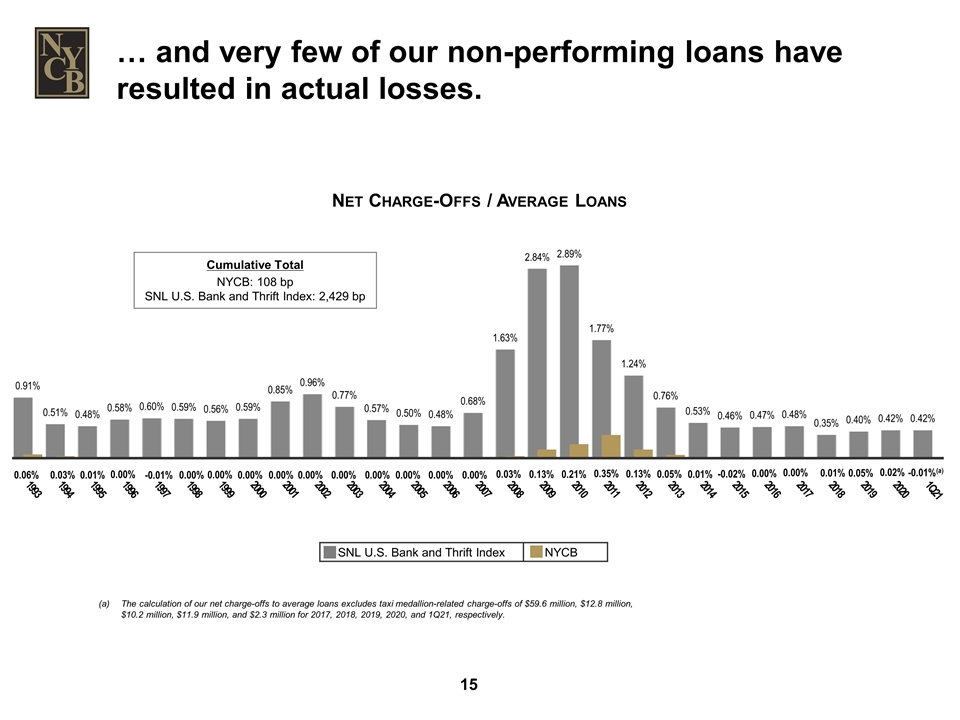
… and very few of our non-performing loans have resulted in actual losses. Net Charge-Offs / Average Loans Cumulative Total NYCB: 108 bp SNL U.S. Bank and Thrift Index: 2,429 bp The calculation of our net charge-offs to average loans excludes taxi medallion-related charge-offs of $59.6 million, $12.8 million, $10.2 million, $11.9 million, and $2.3 million for 2017, 2018, 2019, 2020, and 1Q21, respectively. SNL U.S. Bank and Thrift Index NYCB
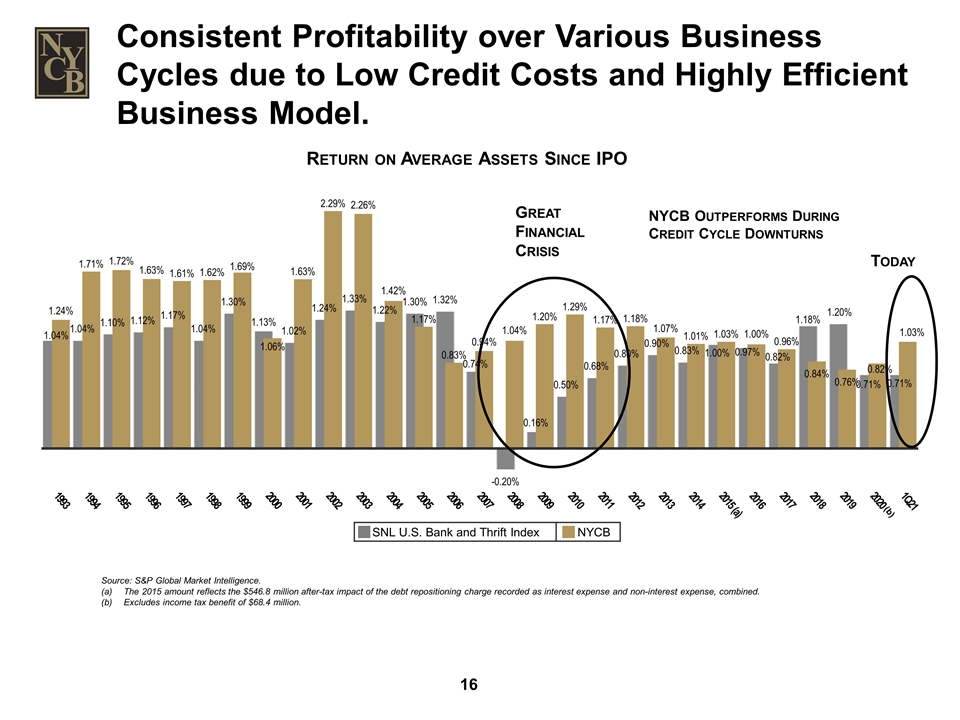
Consistent Profitability over Various Business Cycles due to Low Credit Costs and Highly Efficient Business Model. Source: S&P Global Market Intelligence. The 2015 amount reflects the $546.8 million after-tax impact of the debt repositioning charge recorded as interest expense and non-interest expense, combined. Excludes income tax benefit of $68.4 million. SNL U.S. Bank and Thrift Index NYCB Return on Average Assets Since IPO Great Financial Crisis Today NYCB Outperforms During Credit Cycle Downturns (b)
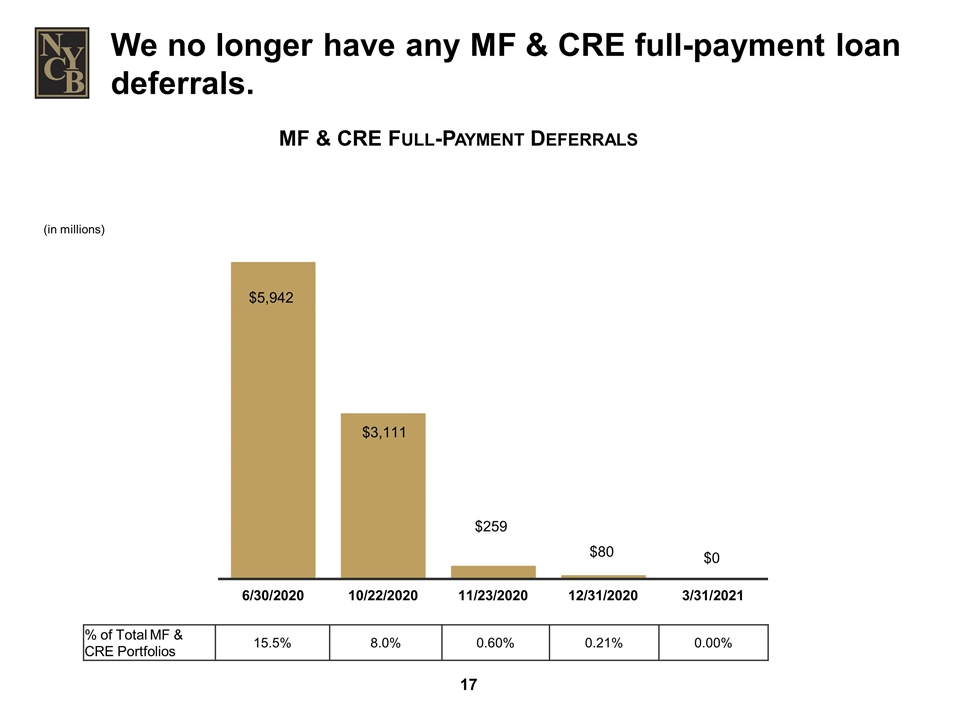
MF & CRE Full-Payment Deferrals (in millions) % of Total MF & CRE Portfolios 15.5% 8.0% 0.60% 0.21% 0.00% We no longer have any MF & CRE full-payment loan deferrals.
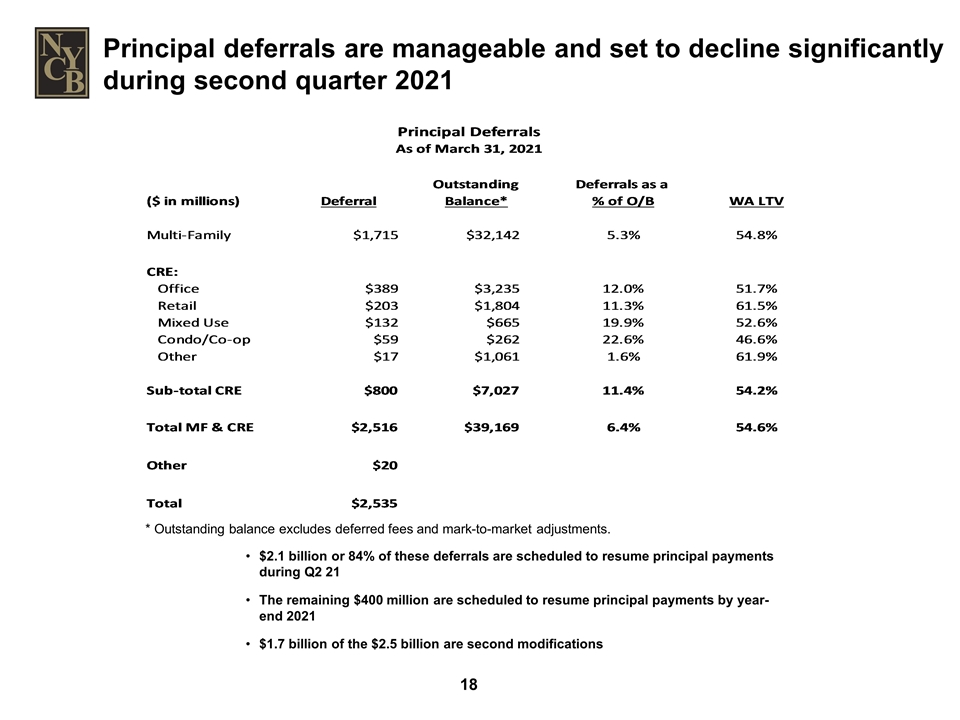
Principal deferrals are manageable and set to decline significantly during second quarter 2021 $2.1 billion or 84% of these deferrals are scheduled to resume principal payments during Q2 21 The remaining $400 million are scheduled to resume principal payments by year-end 2021 $1.7 billion of the $2.5 billion are second modifications * Outstanding balance excludes deferred fees and mark-to-market adjustments. Investor Presentation page 4: (Borrowers Section) Remove bullet 1, change bullet 2 to say 'No loans remain on full payment deferral as of 3/31/21', update bullet 3 dollars and %, and keep bullet 4 Investor Presentation page 17: Add quarter for 3/31/21 showing full payment deferrals at $0 Investor Presentation page 18: Eliminate Investor Presentation page 19 Principal Deferrals As of March 31, 2021 Outstanding Deferrals as a ($ in millions) Deferral Balance* % of O/B WA LTV Multi-Family $1,715.3340072700003 $32,141.858223020012 5.3% 0.54750514135446982 CRE: Office $389.09207007999998 $3,234.8178248000013 0.12028252938913379 0.51675289726950935 Retail $203.33693547999999 $1,804.1394788999996 0.11270577350481593 0.61534331262707975 Mixed Use $132.05171949999996 $664.98202681000032 0.19857938136082884 0.52622047099152691 Condo/Co-op $59.312018460000004 $262.33691470000008 0.22609101173514712 0.46614227902497857 Other $16.61259119 $1,061.439616399995 1.6% 0.61862318226155066 Sub-total CRE $800.40533470999992 $7,027.3202068500013 0.11389908402491622 0.54172498694033333 Total MF & CRE $2,515.7393419800001 $39,169.178429870015 6.4% 0.54566613269752329 Other $19.600069090000005 Total $2,535.3394110700001 *Outstanding Balance excludes deferred fees and mark to market adjustments Eliminate all prior quarter bullet points and add 2 below: New: $2.1B of the $2.5B is scheuduled to resume principal payments by Jul 1, and the remaining $400M by year end. New: $1.75B of the $2.5B are 2nd modifications
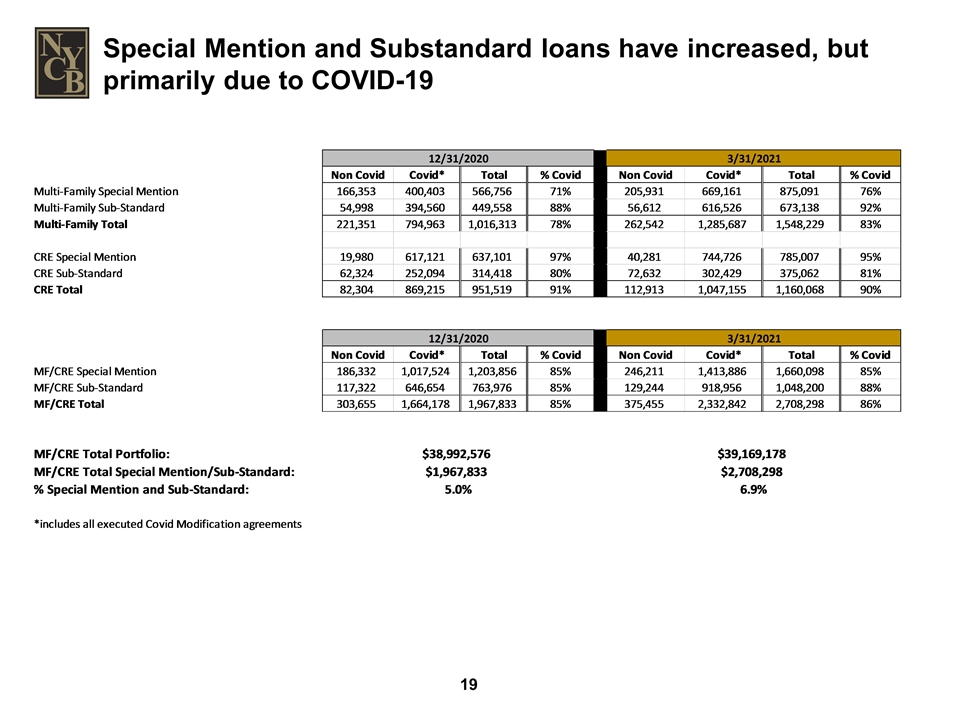
Special Mention and Substandard loans have increased, but primarily due to COVID-19
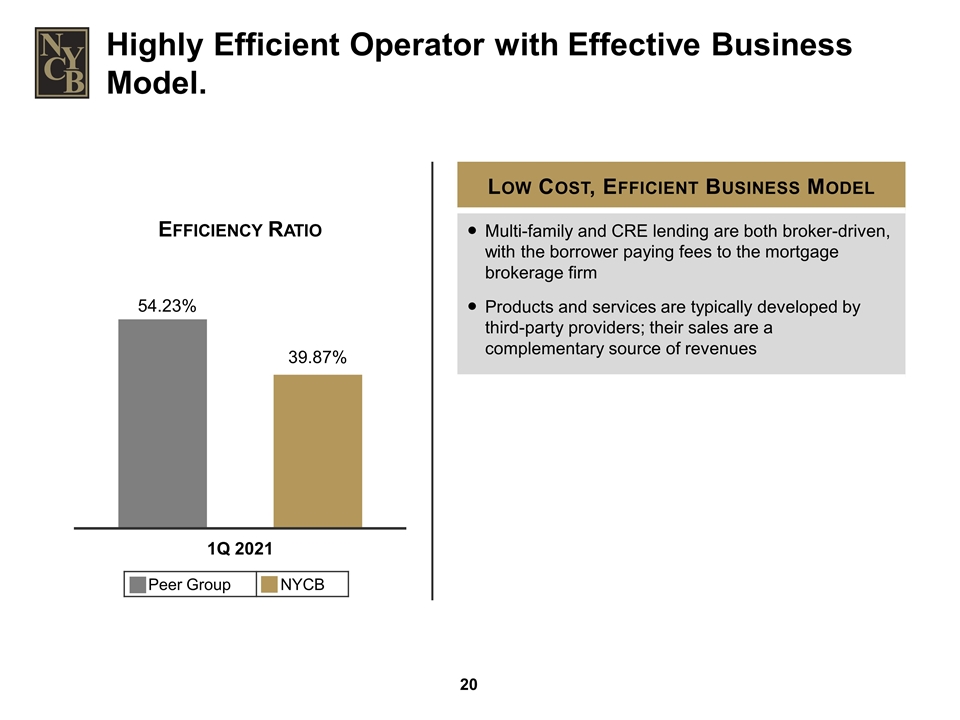
Efficiency Ratio Peer Group NYCB Highly Efficient Operator with Effective Business Model. Low Cost, Efficient Business Model Multi-family and CRE lending are both broker-driven, with the borrower paying fees to the mortgage brokerage firm Products and services are typically developed by third-party providers; their sales are a complementary source of revenues
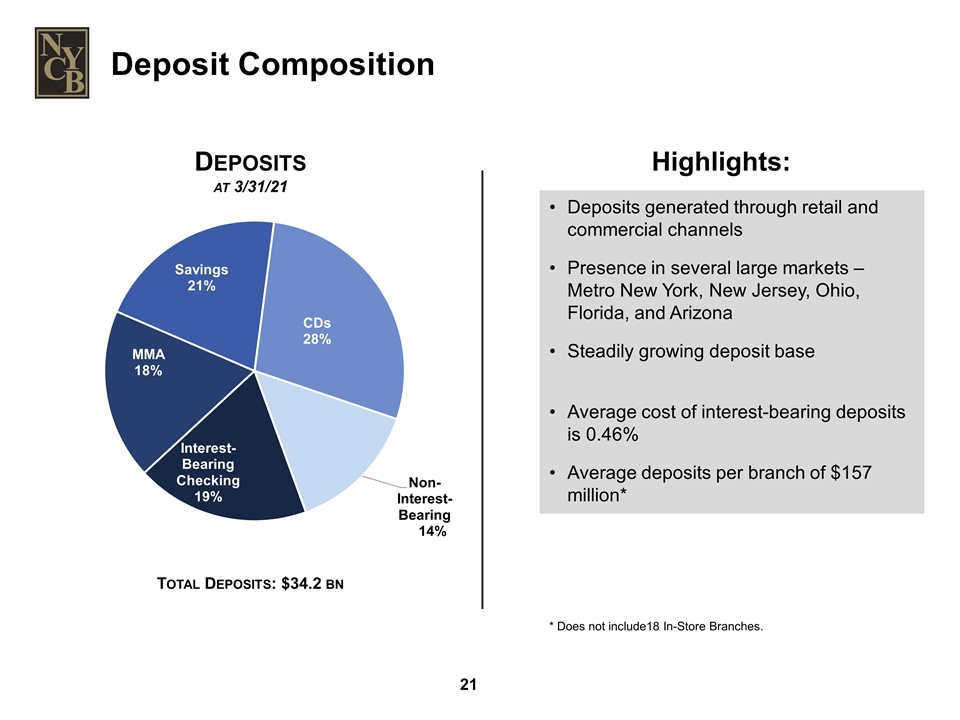
Total Deposits: $34.2 bn Deposits at 3/31/21 Deposit Composition Deposits generated through retail and commercial channels Presence in several large markets – Metro New York, New Jersey, Ohio, Florida, and Arizona Steadily growing deposit base Average cost of interest-bearing deposits is 0.46% Average deposits per branch of $157 million* Highlights: * Does not include18 In-Store Branches.
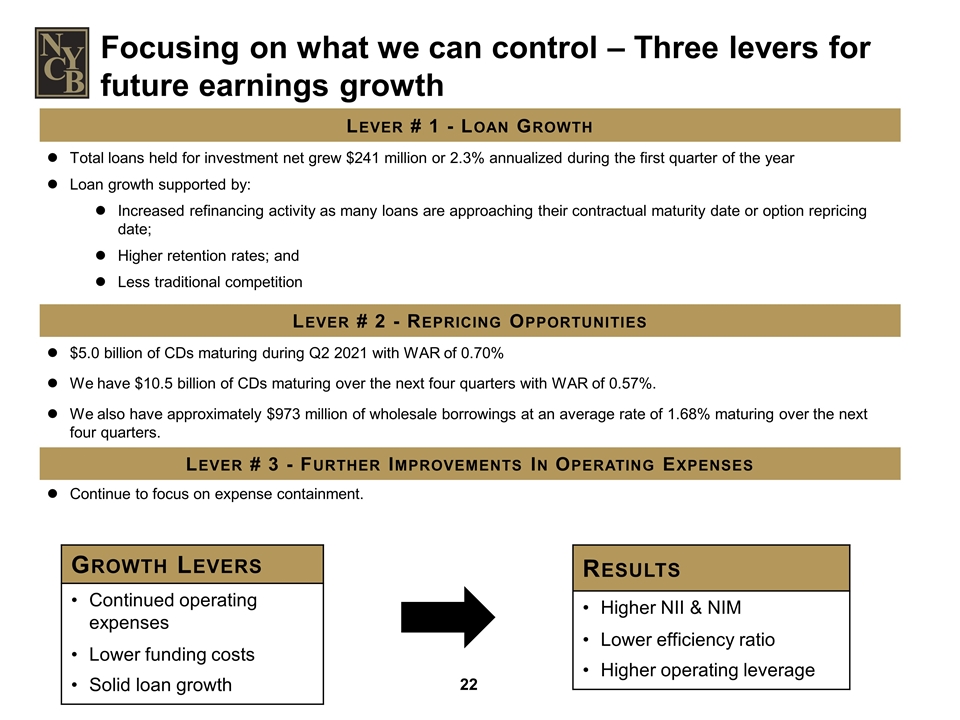
Lever # 1 - Loan Growth Total loans held for investment net grew $241 million or 2.3% annualized during the first quarter of the year Loan growth supported by: Increased refinancing activity as many loans are approaching their contractual maturity date or option repricing date; Higher retention rates; and Less traditional competition Lever # 2 - Repricing Opportunities $5.0 billion of CDs maturing during Q2 2021 with WAR of 0.70% We have $10.5 billion of CDs maturing over the next four quarters with WAR of 0.57%. We also have approximately $973 million of wholesale borrowings at an average rate of 1.68% maturing over the next four quarters. Lever # 3 - Further Improvements In Operating Expenses Continue to focus on expense containment. Focusing on what we can control – Three levers for future earnings growth Results Higher NII & NIM Lower efficiency ratio Higher operating leverage Growth Levers Continued operating expenses Lower funding costs Solid loan growth
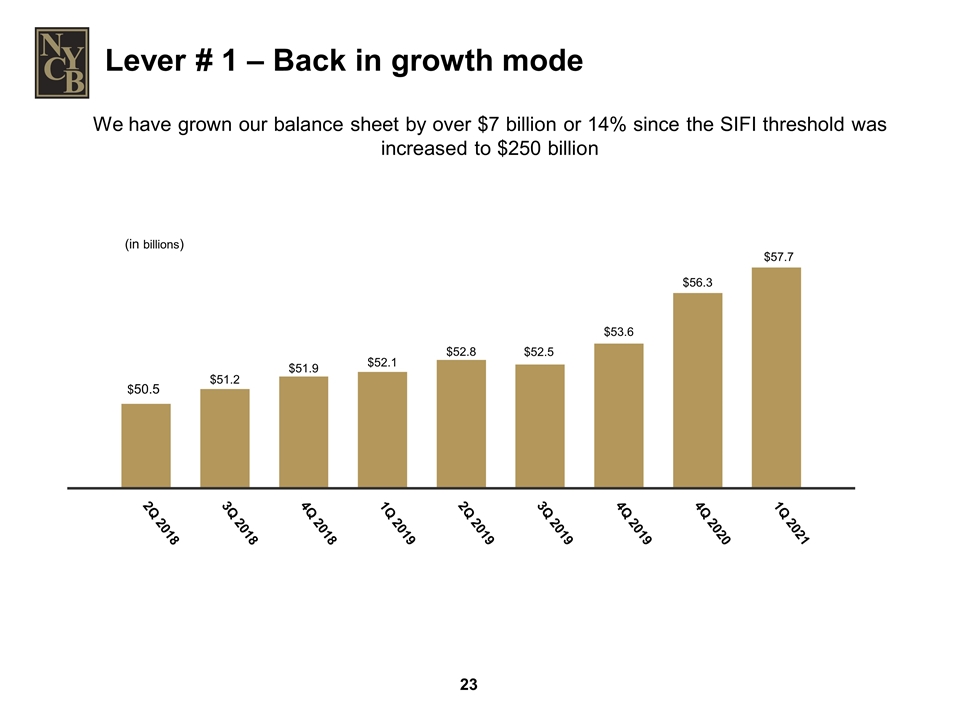
Lever # 1 – Back in growth mode We have grown our balance sheet by over $7 billion or 14% since the SIFI threshold was increased to $250 billion
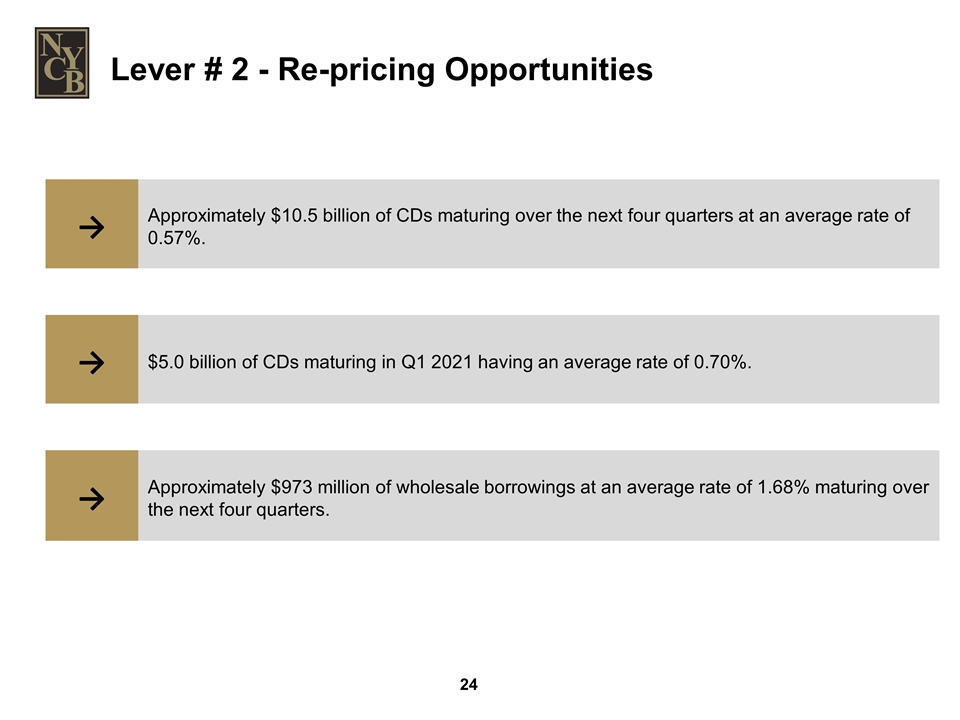
Lever # 2 - Re-pricing Opportunities → Approximately $973 million of wholesale borrowings at an average rate of 1.68% maturing over the next four quarters. → Approximately $10.5 billion of CDs maturing over the next four quarters at an average rate of 0.57%. → $5.0 billion of CDs maturing in Q1 2021 having an average rate of 0.70%.
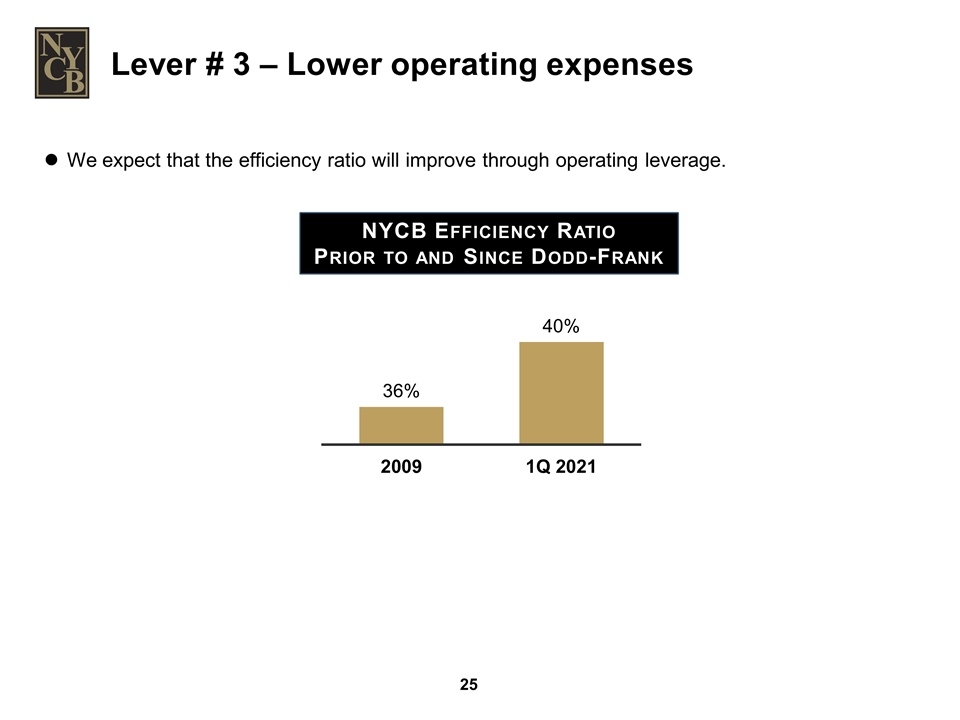
NYCB Efficiency Ratio Prior to and Since Dodd-Frank We expect that the efficiency ratio will improve through operating leverage. Lever # 3 – Lower operating expenses
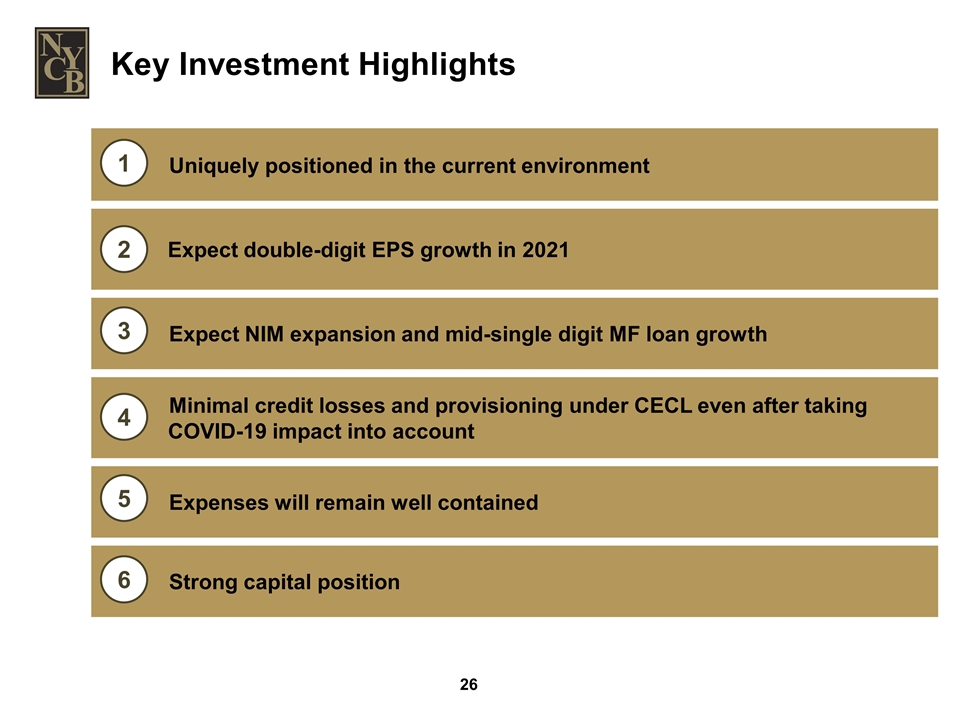
Key Investment Highlights Uniquely positioned in the current environment Expect double-digit EPS growth in 2021 Expect NIM expansion and mid-single digit MF loan growth Minimal credit losses and provisioning under CECL even after taking COVID-19 impact into account Expenses will remain well contained Strong capital position 1 4 5 3 2 6
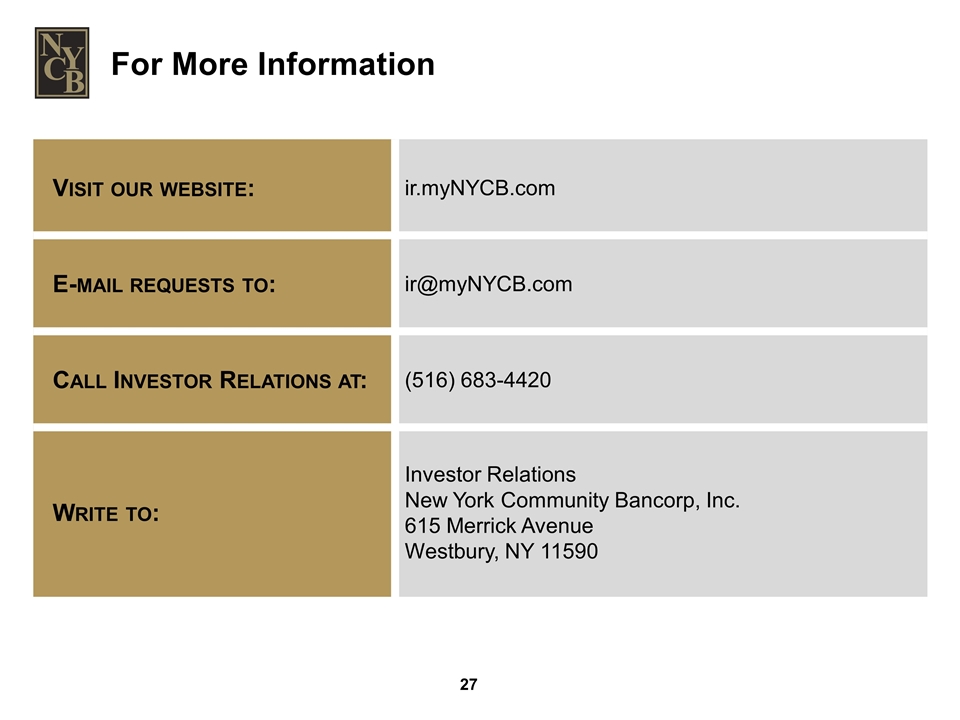
Visit our website: ir.myNYCB.com E-mail requests to: ir@myNYCB.com Call Investor Relations at: (516) 683-4420 Write to: Investor Relations New York Community Bancorp, Inc. 615 Merrick Avenue Westbury, NY 11590 For More Information
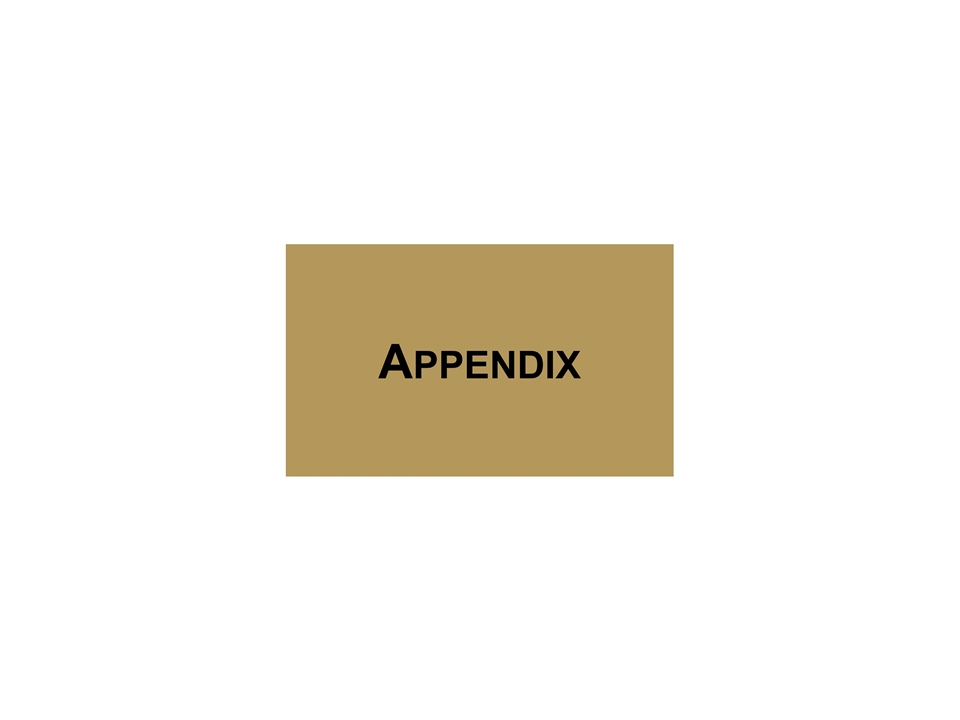
Appendix
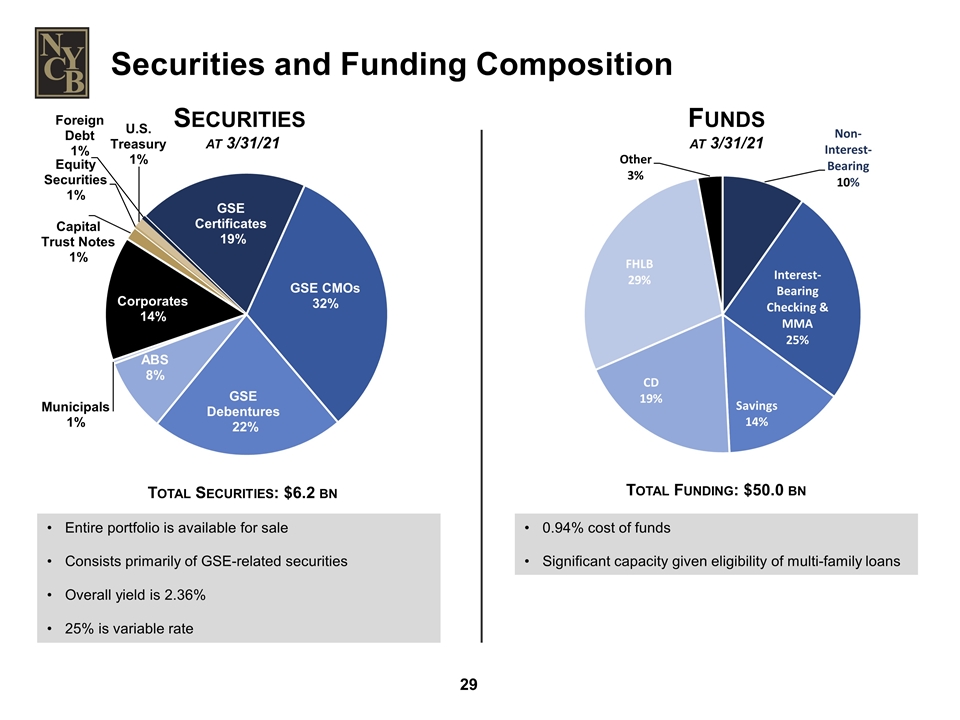
Securities and Funding Composition Funds at 3/31/21 0.94% cost of funds Significant capacity given eligibility of multi-family loans Total Funding: $50.0 bn Entire portfolio is available for sale Consists primarily of GSE-related securities Overall yield is 2.36% 25% is variable rate Securities at 3/31/21 Total Securities: $6.2 bn
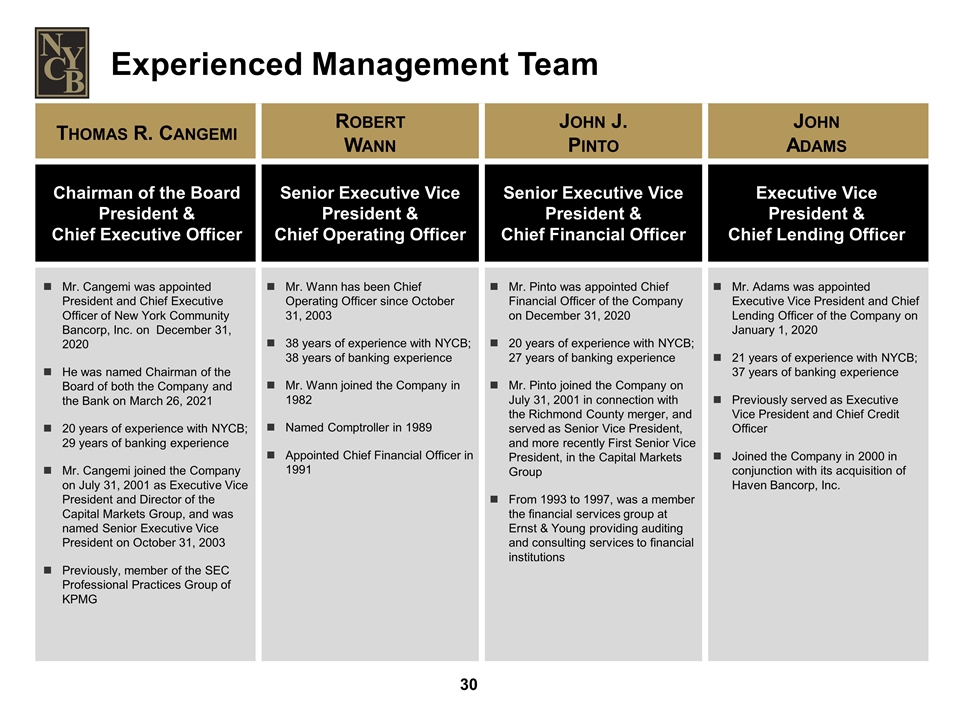
Experienced Management Team Thomas R. Cangemi Robert Wann John J. Pinto John Adams Chairman of the Board President & Chief Executive Officer Senior Executive Vice President & Chief Operating Officer Senior Executive Vice President & Chief Financial Officer Executive Vice President & Chief Lending Officer Mr. Cangemi was appointed President and Chief Executive Officer of New York Community Bancorp, Inc. on December 31, 2020 He was named Chairman of the Board of both the Company and the Bank on March 26, 2021 20 years of experience with NYCB; 29 years of banking experience Mr. Cangemi joined the Company on July 31, 2001 as Executive Vice President and Director of the Capital Markets Group, and was named Senior Executive Vice President on October 31, 2003 Previously, member of the SEC Professional Practices Group of KPMG Mr. Wann has been Chief Operating Officer since October 31, 2003 38 years of experience with NYCB; 38 years of banking experience Mr. Wann joined the Company in 1982 Named Comptroller in 1989 Appointed Chief Financial Officer in 1991 Mr. Pinto was appointed Chief Financial Officer of the Company on December 31, 2020 20 years of experience with NYCB; 27 years of banking experience Mr. Pinto joined the Company on July 31, 2001 in connection with the Richmond County merger, and served as Senior Vice President, and more recently First Senior Vice President, in the Capital Markets Group From 1993 to 1997, was a member the financial services group at Ernst & Young providing auditing and consulting services to financial institutions Mr. Adams was appointed Executive Vice President and Chief Lending Officer of the Company on January 1, 2020 21 years of experience with NYCB; 37 years of banking experience Previously served as Executive Vice President and Chief Credit Officer Joined the Company in 2000 in conjunction with its acquisition of Haven Bancorp, Inc.
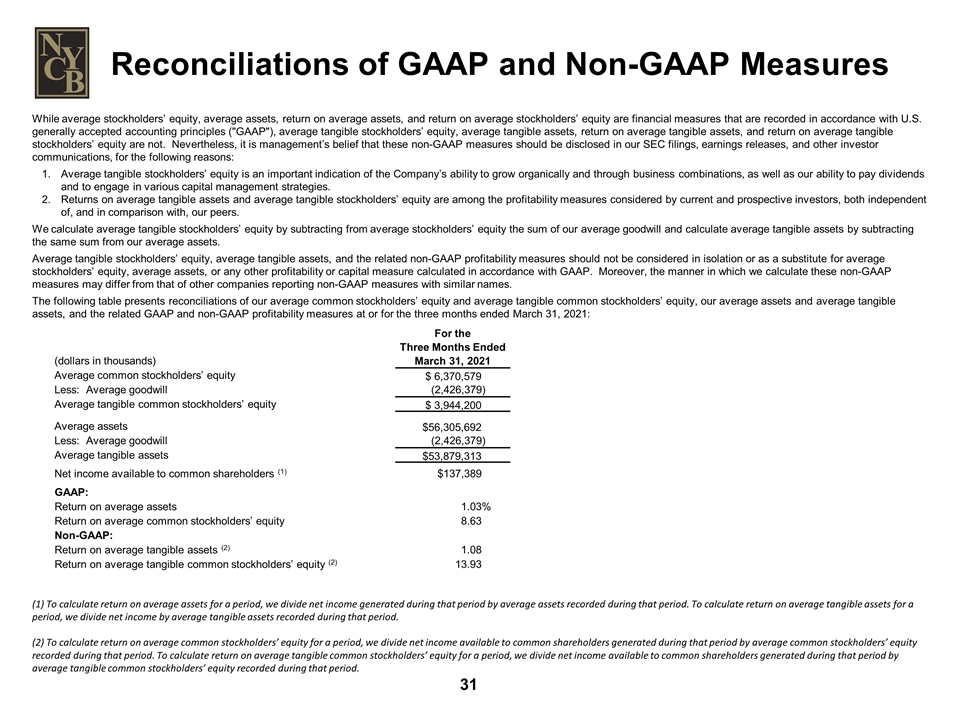
While average stockholders’ equity, average assets, return on average assets, and return on average stockholders’ equity are financial measures that are recorded in accordance with U.S. generally accepted accounting principles ("GAAP"), average tangible stockholders’ equity, average tangible assets, return on average tangible assets, and return on average tangible stockholders’ equity are not. Nevertheless, it is management’s belief that these non-GAAP measures should be disclosed in our SEC filings, earnings releases, and other investor communications, for the following reasons: Average tangible stockholders’ equity is an important indication of the Company’s ability to grow organically and through business combinations, as well as our ability to pay dividends and to engage in various capital management strategies. Returns on average tangible assets and average tangible stockholders’ equity are among the profitability measures considered by current and prospective investors, both independent of, and in comparison with, our peers. We calculate average tangible stockholders’ equity by subtracting from average stockholders’ equity the sum of our average goodwill and calculate average tangible assets by subtracting the same sum from our average assets. Average tangible stockholders’ equity, average tangible assets, and the related non-GAAP profitability measures should not be considered in isolation or as a substitute for average stockholders’ equity, average assets, or any other profitability or capital measure calculated in accordance with GAAP. Moreover, the manner in which we calculate these non-GAAP measures may differ from that of other companies reporting non-GAAP measures with similar names. The following table presents reconciliations of our average common stockholders’ equity and average tangible common stockholders’ equity, our average assets and average tangible assets, and the related GAAP and non-GAAP profitability measures at or for the three months ended March 31, 2021: (1) To calculate return on average assets for a period, we divide net income generated during that period by average assets recorded during that period. To calculate return on average tangible assets for a period, we divide net income by average tangible assets recorded during that period. (2) To calculate return on average common stockholders’ equity for a period, we divide net income available to common shareholders generated during that period by average common stockholders’ equity recorded during that period. To calculate return on average tangible common stockholders’ equity for a period, we divide net income available to common shareholders generated during that period by average tangible common stockholders’ equity recorded during that period. Reconciliations of GAAP and Non-GAAP Measures (dollars in thousands) For the Three Months Ended March 31, 2021 Average common stockholders’ equity $ 6,370,579 Less: Average goodwill (2,426,379) Average tangible common stockholders’ equity $ 3,944,200 Average assets $56,305,692 Less: Average goodwill (2,426,379) Average tangible assets $53,879,313 Net income available to common shareholders (1) $137,389 GAAP: Return on average assets 1.03% Return on average common stockholders’ equity 8.63 Non-GAAP: Return on average tangible assets (2) 1.08 Return on average tangible common stockholders’ equity (2) 13.93
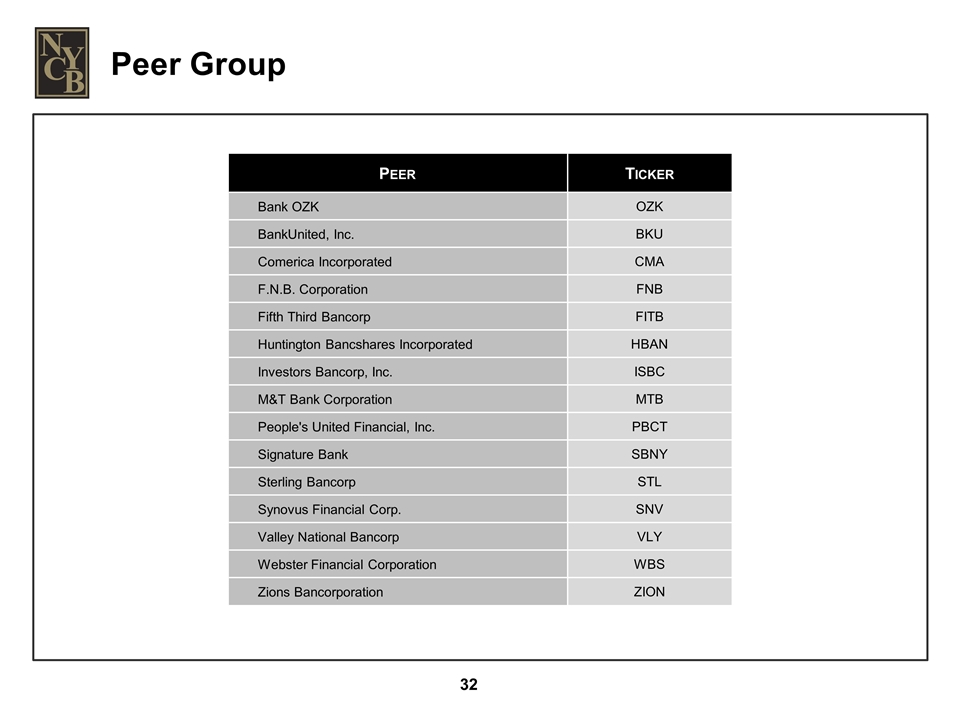
Peer Group Peer Ticker Bank OZK OZK BankUnited, Inc. BKU Comerica Incorporated CMA F.N.B. Corporation FNB Fifth Third Bancorp FITB Huntington Bancshares Incorporated HBAN Investors Bancorp, Inc. ISBC M&T Bank Corporation MTB People's United Financial, Inc. PBCT Signature Bank SBNY Sterling Bancorp STL Synovus Financial Corp. SNV Valley National Bancorp VLY Webster Financial Corporation WBS Zions Bancorporation ZION
